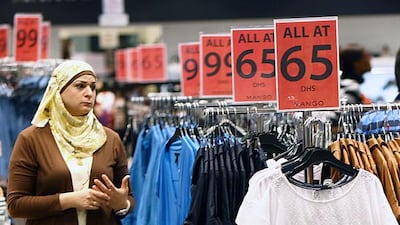A decade-long retail boom has been built around UAE shoppers’ love of the mall. But a strong dollar, weakening consumer confidence and the rise of e-commerce are changing shopping habits.
This comes with millions of square feet of new mall space due to complete by the end of the decade, including what could be the most lavish shopping centre ever built in the form of the 8 million square feet Mall of the World to be developed by Dubai Holding. “We are seeing some signs of stress since late last year,” says Jayant Ganwani, chief executive of the Dubai-based Lals Group. “It effects different segments of the retail stratosphere in different ways. The fast-moving consumer goods and middle market items have seen far less attrition than the high-end haute couture conspicuous consumption items.” Double-digit passenger growth through airports in Dubai and Abu Dhabi, the tax-free salaries of residents and a rapidly expanding population have encouraged a wave of mega-mall development with a second wave of community mall construction following rapidly behind. But now retailers are facing the strongest economic headwinds since the financial crisis, stoked by a weak oil price and associated slowing economy. Last week the IMF cut its projections for the UAE’s economic growth to 3.2 per cent this year. It was the second time in six months that the IMF has revised its growth forecast for the UAE down from 4.5 per cent in October. Other oil exporters in the region face similar downgrades. “If there is a fear of recession the first thing that the consumer in the middle market does is start to hoard money in case they lose their job,” says Mr Ganwani, whose company owns the Homes R Us chain of furniture stores. “When they go through this phase they basically stop spending money on anything durable in nature – so electronics, furniture and fashion. That is what we are seeing at the moment.” The strong dollar is also crimping the purchasing power of visitors from the euro zone, while the collapse of the rouble has had a devastating impact of on the number of Russian tourists who visit and the amount of money they spend. Those factors are already combining to create tension in Dubai’s retail sector say consultants, as some retailers struggle to reconcile the rents they pay with declining till receipts. “The retail market continues to be constrained by the decrease in spending, restricting overall growth levels,” said Craig Plumb, the regional head of research at JLL, the international real estate consultants in its latest report on the Dubai retail sector. “We expect performance of the retail market to remain stagnant throughout 2015, following estimates of a slowdown in retail sales growth figures,” he said.
“In the end convenience is cost,” says Florian Mack, the co-owner of the e-commerce start-up lens.ae, which sells contact lenses online. That challenges the conventional wisdom of the UAE retail industry, which maintains shopping is a leisure activity in its own right – one of several reasons that shoppers have been slower to adopt online shopping than in other regions – together with a reluctance to trust the web with personal bank details. “We’ve been hearing that since we started,” says Hosam Arab, a co-founder of namshi.com, the online fashion and footwear retailer.
scronin@thenational.ae
Follow The National's Business section on Twitter

